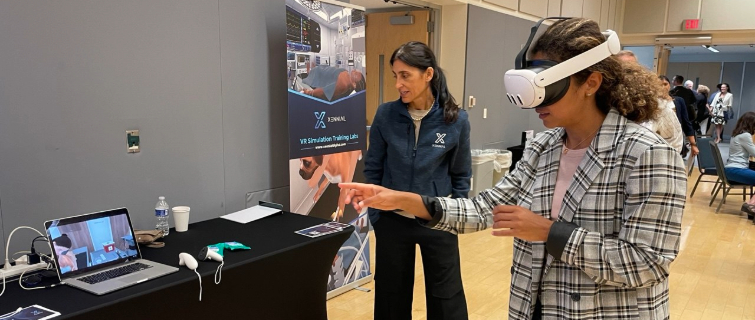
This article is from the 2023–2024 Dean's Report.
“Epicurus is my go-to philosopher,” a Liberal Studies student once declared.
For those familiar with the Liberal Studies programs at Georgetown, that statement is not all that surprising. Though firmly grounded in the present, these programs go as far back as necessary to examine the human condition—which might mean studying a favorite Greek philosopher who just happens to be 2,566 years old.
So, it might surprise someone to see that the Bachelor of Arts in Liberal Studies program has a new course called Artificial Intelligence, a field that didn’t exist 70 years ago but has come into its own recently with groundbreaking developments in Deep Learning and Generative AI (GenAI).
The new Liberal Studies course is just one of many initiatives that the School of Continuing Studies (SCS) and Georgetown as a whole are taking to explore the possibilities and meet the challenges posed by this burgeoning technology. Across SCS’s portfolio of degree and non-degree programs, students and faculty are learning, discussing, and in some instances, applying the real-time implications of AI in their respective industries.
— Dr. Frederic Lemieux
“While there is optimism about AI’s positive impact, there is also a consensus on the need for guardrails to protect creative work and maintain ethical standards,” Frederic Lemieux, Ph.D., wrote in a commentary about an SCS-sponsored AI Intersectional Seminar series hosted last spring. He is the faculty director and professor of the practice of the master’s programs in Applied Intelligence, Artificial Intelligence Management, Cybersecurity Risk Management, and Information Technology Management.
“The message is clear: Understanding and embracing AI is critical, as it will be a permanent fixture in our professional and personal lives,” Lemieux said.
A University-Wide Initiative
The undergraduate Artificial Intelligence course debuted in Fall 2024. Designed by Lemieux and Microsoft executive Danielle Estrada, the program requires students to approach this emerging technology with the same critical thinking and analytical skills that they apply to other areas of the curriculum. Also, in the past year, SCS has introduced two new professional certificates: the Certificate in AI Governance & Compliance and the Certificate in GenAI for Team Productivity.
Additionally, in Fall 2025, classes will begin in the new Master’s in Artificial Intelligence Management program, which will examine issues such as AI leadership and market analysis, creative and generative AI, and ethical and moral issues surrounding the technology. These are all part of a broad-based examination and development of the technology at SCS and Georgetown as a whole.
When Estrada was beginning work on the AI programs, she encountered some skepticism about whether Georgetown should embrace a nascent technology largely known for its negative connotations: reports across the country of students using AI to write their papers; concerns that it could kill jobs; and news of it spreading disinformation and stoking fear.
These are all valid concerns, Estrada said, but that does not call for running from AI or pretending that the technology does not exist and is not growing in sophistication by the day. According to Estrada, it is better to seek to understand it—to run “toward” it, carefully—and learn where it is headed and how society might respond.
University-wide, Georgetown’s AI initiatives are being coordinated by the Center for New Designs in Learning and Scholarship (CNDLS). Founded more than 20 years ago, the Center also focuses on experiential learning, and inquiry and discourse, which concerns issues surrounding free expression in the classroom.
In April 2023, then-Provost Robert Groves (who is now serving as Interim President of Georgetown University) announced the establishment of the Georgetown Initiative on Pedagogical Uses of Artificial Intelligence (IPAI).
“The goal of the initiative is to support faculty trial uses of AI systems in a wide variety of class settings,” Groves wrote in the Provost’s Blog. “The initiative will be open to all faculty, from the humanities, social sciences, and natural sciences; to all schools; to all levels of teaching, both undergraduate and graduate programs.”
An Ongoing Experiment
At SCS, faculty members are working with Anna Butsay and her team of instructional designers in CNDLS to see where AI could be helpful, both in instruction and program design.
“If I were to highlight one of the top tools that we’ve been using, it’s definitely ChatGPT,” said Butsay, who is associate dean of learning design. “We have tested it in various ways to help us improve our work as instructional designers and also help with regular tasks like creating tables, brainstorming, and summarizing information.”
Because ChatGPT can quickly organize large amounts of material, it can be a good timesaver, Butsay said. But it does not actually design courses or even portions of them. It is used merely as a tool to spark discussion and could eventually help make course design more efficient.
Faculty members have also worked with Butsay and her colleagues to create AI-generated videos. For example, an instructor can record a 10-minute video, and AI can use her voice and additional material to create perhaps dozens of other videos using the instructor’s image and voice. Or it can translate an existing video into other languages.
These projects are still in the experimentation stage. Butsay emphasized that whenever an instructor works with the instructional design team to create an AI-generated video that is shown in class, students are told, in the interest of transparency, that it was created with the help of AI.
Testing ChatGPT and other platforms gives instructors and course designers the chance to see where they may become useful in the future. And it helps them keep abreast of an industry that is introducing hundreds of new AI products every year.
“I think it’s important to continue to experiment with the tools that are coming out, all the platforms that we are using,” Butsay said. “This is just the next step for us, but there are still some concerns and things we need to figure out to make sure we’re using it responsibly and ethically.”
“I don’t think we need to stop the process, and I don’t think we can stop the process,” she said. “Because it’s part of our evolution as human beings.”
— Anna Butsay
